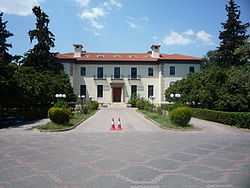Harokopio University
| Harokopio University | |
|---|---|
| Χαροκόπειο Πανεπιστήμιο | |
 | |
| Established | 1990 |
| Type | Public |
| Chancellor | Anagnostopoulos D. |
| Vice-Chancellor |
Yeorgitsoyanni E. |
| Students | approx. 1150 |
| Location | Athens, Greece |
| Campus | Kallithea |
| Nickname | HUA |
| Website | www.hua.gr |
Harokopio University (Greek: Χαροκόπειο Πανεπιστήμιο) is a public research university in Athens, Greece. Founded in 1990 as the successor of the Harokopios Higher School of Home Economics that was established in 1929, the university has ever since expanded to further scientific areas. Harokopio awards bachelor's, master's, as well as Ph.D. degrees.
History
The University is named after Panagis Harokopos (1835–1911), who took care of the founding and funding of a school oriented towards the production of scientific potential in Home Economics. To achieve his vision he bought a plot of 20,000 m² in the borough of Kallithea, where between 1915 and 1920 the school was built. A new wing was added in 1959.
This complex of buildings housed the "Harokopios Higher School" until 1990, when the Harokopio University was founded. The development of the University was based on international standards and scientific research that was conducted by the Institute of Regional Development of the Panteion University after request of the Ministry of Education.
Today



The infrastructure of the university is of high level, in fact it was fully restored in 1993-1994 while a new building was erected in 1999-2000 to house the newly established Geography Department and the library. A new building, outside the campus, is expected to expand the institution's infrastructure.
The university's small size (four departments, about 120 academic and research staff, 80 administration personnel and 1000 undergraduate, 150 MSc and 120 PhD students) makes it a flexible, highly specialised and dynamic academic institution. It is active in academic research and teaching in the wider fields of “Geography”, “Home Economics and Ecology”, “Nutritional Sciences and Dietetics” and “Informatics and Telematics”, all including – to a larger or smaller extent – the study of the different aspects of the environment. Its ratio of journal publications per academic member of staff ranks it 4th among the 21 Greek Universities. During the last 10 years over 300 national, European and company funded research programmes were implemented by HUA, giving it again one of the highest ratios of projects per academic member of staff among Greek Universities. Through these programmes, as well as its extensive ERASMUS educational exchange program, the University has built an extensive network of high quality co-operation with other academic and research institutes and the private sector in Greece, Europe and worldwide.
The WASP Tool project is carried out by the interdepartmental research group on “Sustainable Environmental Management & Technology - SEMT”, which has considerable experience on the various issues of waste management, with special emphasis on organic waste, LCA, sustainable development, environmental management, population and environment interrelations, environmental mapping, as well as environmental microbiology and biotechnology. Close co-operation with the research group on “Computer Modelling” will be established.
[1]
Harokopio, through its Department of Geography, takes part in the European Spatial Development Planning Network along with other 16 European Universities.[2]
According to research conducted by the National Documentation Center that regards the bibliometric analysis of Greek publications for the period 2006-2010, Harokopio ranked 4th among Greek universities by citation impact with a score that exceeded the world average.[3]
The President of the institution's council is John N. Tsitsiklis, professor at Massachusetts Institute of Technology (MIT).
Academic Departments
The study programmes offered by Harokopio cover fields that are unique or relatively underdeveloped in Greece.
There are four departments offering undergraduate studies:
- Department of Dietetics and Nutritional Science
- Department of Geography
- Department of Informatics and Telematics
- Department of Home Economics and Ecology
Respectively, there are four post-graduate programmes, each one having three directions.
See also
References
External links
- Harokopio University - Official website (Greek) (English)
- Harokopio University DASTA Office (Career Office & Innovation Unit) (Greek) (English)
- Hellenic Quality Assurance and Accreditation Agency (HQAA) (Greek) (English)
- "ATHENA" Plan for Higher Education (Greek)
- Greek Research & Technology Network (GRNET) (Greek) (English)
- okeanos (GRNET's cloud service) (Greek) (English)
- synnefo - Open Source Cloud Software (GRNET) (Greek) (English)
| ||||||||||||||||||||||||||||||||||||||||||||
Coordinates: 37°57′40″N 23°42′30″E / 37.96111°N 23.70833°E
